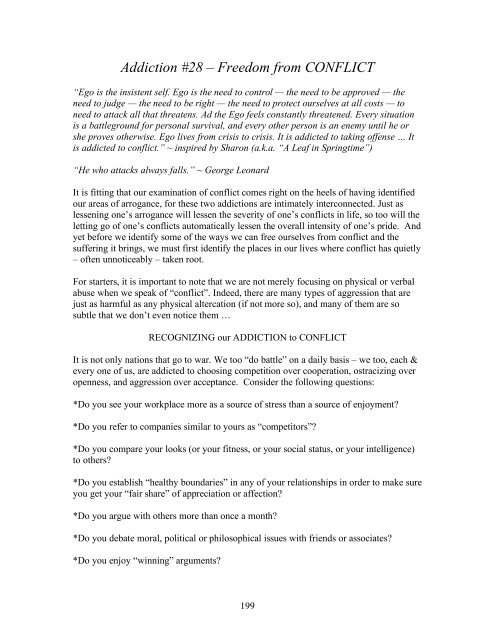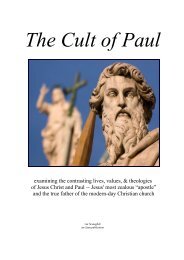Licking the Razor's Edge (2015)
Recognizing the hidden addictions that bind you, … to then set your True Self free
Recognizing the hidden addictions that bind you,
… to then set your True Self free
You also want an ePaper? Increase the reach of your titles
YUMPU automatically turns print PDFs into web optimized ePapers that Google loves.
Addiction #28 – Freedom from CONFLICT<br />
“Ego is <strong>the</strong> insistent self. Ego is <strong>the</strong> need to control — <strong>the</strong> need to be approved — <strong>the</strong><br />
need to judge — <strong>the</strong> need to be right — <strong>the</strong> need to protect ourselves at all costs — to<br />
need to attack all that threatens. Ad <strong>the</strong> Ego feels constantly threatened. Every situation<br />
is a battleground for personal survival, and every o<strong>the</strong>r person is an enemy until he or<br />
she proves o<strong>the</strong>rwise. Ego lives from crisis to crisis. It is addicted to taking offense … It<br />
is addicted to conflict.” ~ inspired by Sharon (a.k.a. “A Leaf in Springtime”)<br />
“He who attacks always falls.” ~ George Leonard<br />
It is fitting that our examination of conflict comes right on <strong>the</strong> heels of having identified<br />
our areas of arrogance, for <strong>the</strong>se two addictions are intimately interconnected. Just as<br />
lessening one’s arrogance will lessen <strong>the</strong> severity of one’s conflicts in life, so too will <strong>the</strong><br />
letting go of one’s conflicts automatically lessen <strong>the</strong> overall intensity of one’s pride. And<br />
yet before we identify some of <strong>the</strong> ways we can free ourselves from conflict and <strong>the</strong><br />
suffering it brings, we must first identify <strong>the</strong> places in our lives where conflict has quietly<br />
– often unnoticeably – taken root.<br />
For starters, it is important to note that we are not merely focusing on physical or verbal<br />
abuse when we speak of “conflict”. Indeed, <strong>the</strong>re are many types of aggression that are<br />
just as harmful as any physical altercation (if not more so), and many of <strong>the</strong>m are so<br />
subtle that we don’t even notice <strong>the</strong>m …<br />
RECOGNIZING our ADDICTION to CONFLICT<br />
It is not only nations that go to war. We too “do battle” on a daily basis – we too, each &<br />
every one of us, are addicted to choosing competition over cooperation, ostracizing over<br />
openness, and aggression over acceptance. Consider <strong>the</strong> following questions:<br />
*Do you see your workplace more as a source of stress than a source of enjoyment?<br />
*Do you refer to companies similar to yours as “competitors”?<br />
*Do you compare your looks (or your fitness, or your social status, or your intelligence)<br />
to o<strong>the</strong>rs?<br />
*Do you establish “healthy boundaries” in any of your relationships in order to make sure<br />
you get your “fair share” of appreciation or affection?<br />
*Do you argue with o<strong>the</strong>rs more than once a month?<br />
*Do you debate moral, political or philosophical issues with friends or associates?<br />
*Do you enjoy “winning” arguments?<br />
199


















